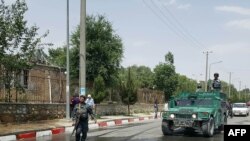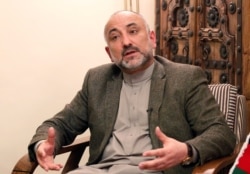Afghan authorities say they have arrested four Islamic State (IS) operatives, including a university teacher, during a counterterrorism raid in Kabul.
The arrests come amid recent reports the Middle Eastern terrorist group has grown into a major security challenge for U.S.-backed Afghan forces struggling to contain the Taliban insurgency.
Afghanistan's spy agency, National Directorate of Security (NDS), while announcing the arrests, said in a statement the suspects were involved in recruiting fighters for IS and organizing terrorist attacks in and around the capital city.
It identified one of the detainees as a Kabul University lecturer, Mubashir Muslimyar, while the rest as graduates of the same institution. The men are said to have told investigators they were working closely with IS operatives in eastern Nangarhar province and many educated young Afghans were joining their ranks.
This is not the first time that the NDS has arrested suspected IS operatives from Kabul University. Weeks back, another lecturer was also taken into custody on the same charges.
IS has not commented on the arrests.
The Afghan branch of IS operates under the name of Khorasan Province (ISKP). It is estimated to have about 2,000 fighters in the country.
Locally known as Daesh, the terrorist outfit has carried out major attacks in Kabul and Nangarhar, where it is believed to have set up strong bases in several districts. The militants are also active in parts of the adjoining eastern Kunar province.
Former Afghan national security advisrr, Haneef Atmar, told VOA militants linked to IS also are present in northeastern Badakhshan and northern provinces of Jowzjan and Faryab.
“They are a threat and they are not just a threat to Afghanistan they are a threat to the entire region and global security. So, it is not an exaggeration, it’s a sad reality and we have to deal with it,” said Atmar, who is also a key candidate in Afghanistan's presidential election due in September.
Atmar noted that "thousands of foreign fighters" associated with regional and global terrorist groups are operating in Afghanistan. They include Daesh, al-Qaida, Islamic Movement of Uzbekistan (IMU) and East Turkistan Islamic Movement (ETIM), which is blamed for attacks in China, he said.
The U.S. commander of American and NATO forces in Afghanistan, General Austin Miller, in a recent interview described IS as “a problem to all of us” and cautioned it could stage and plan attacks in the West.
“I think they're a very dangerous group internal to Afghanistan, certainly to the region as well as Europe and the United States of America,” Miller told RFE/RL's Radio Free Afghanistan.
U.S. counterterrorism forces, in coordination with Afghan partners, routinely conduct operations against ISKP bases in the country, killing hundreds of militants. The Taliban also has engaged in deadly clashes with the ultra-radical IS militants. But despite those pressures, IS continues to operate in Afghanistan.
Atmar, who is a presidential candidate, praised ongoing U.S.-led efforts to strike a peace deal with the Taliban, saying such an eventuality will enable his country to effectively fight terrorism.
“While it is absolutely necessary to make peace between the Taliban and the government of Afghanistan, it is equally important to address the problem of foreign fighters. If we resolve the first problem, (peace between) the Taliban and the government of Afghanistan, then it will be a lot more feasible to solve the second problem.”





